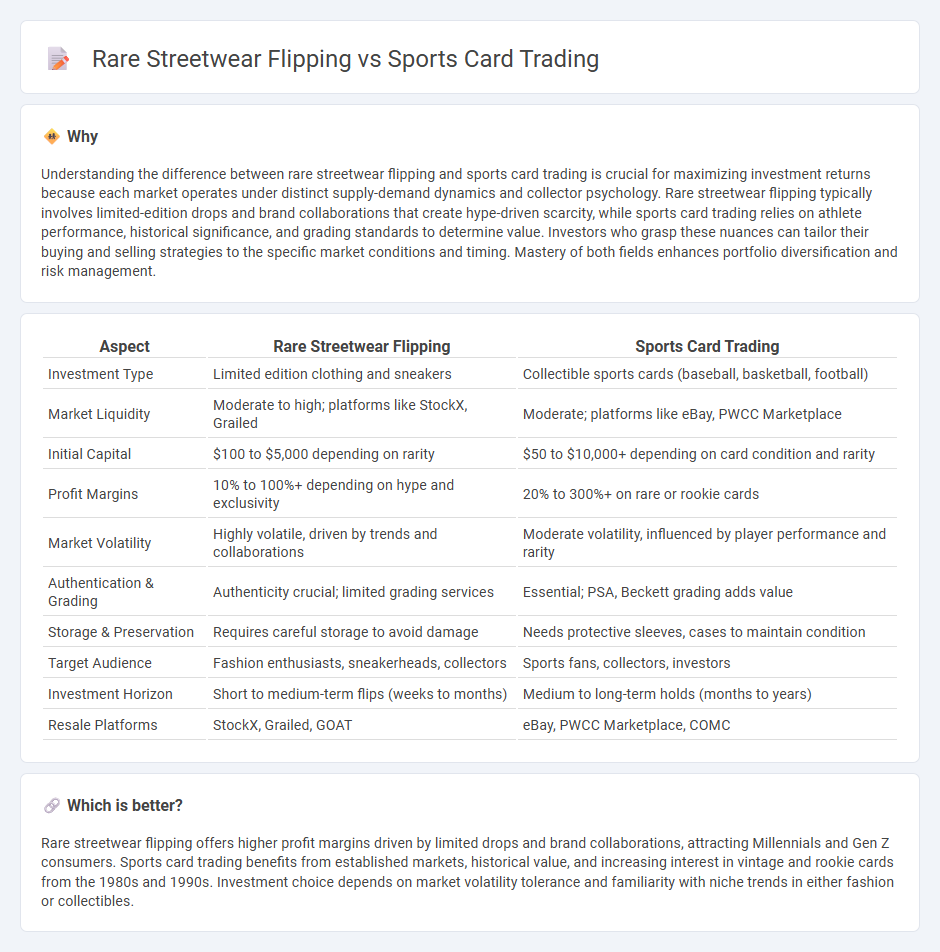
Rare streetwear flipping capitalizes on limited-edition drops from brands like Supreme and Off-White, leveraging hype and scarcity to drive rapid resale profits, often within days or weeks. Sports card trading focuses on acquiring and selling graded cards from iconic athletes, with values influenced by player performance, rarity, and market trends, sometimes holding assets for longer-term appreciation. Explore the distinct strategies and market dynamics behind these two lucrative investment avenues.
Why it is important
Understanding the difference between rare streetwear flipping and sports card trading is crucial for maximizing investment returns because each market operates under distinct supply-demand dynamics and collector psychology. Rare streetwear flipping typically involves limited-edition drops and brand collaborations that create hype-driven scarcity, while sports card trading relies on athlete performance, historical significance, and grading standards to determine value. Investors who grasp these nuances can tailor their buying and selling strategies to the specific market conditions and timing. Mastery of both fields enhances portfolio diversification and risk management.
Comparison Table
| Aspect | Rare Streetwear Flipping | Sports Card Trading |
|---|---|---|
| Investment Type | Limited edition clothing and sneakers | Collectible sports cards (baseball, basketball, football) |
| Market Liquidity | Moderate to high; platforms like StockX, Grailed | Moderate; platforms like eBay, PWCC Marketplace |
| Initial Capital | $100 to $5,000 depending on rarity | $50 to $10,000+ depending on card condition and rarity |
| Profit Margins | 10% to 100%+ depending on hype and exclusivity | 20% to 300%+ on rare or rookie cards |
| Market Volatility | Highly volatile, driven by trends and collaborations | Moderate volatility, influenced by player performance and rarity |
| Authentication & Grading | Authenticity crucial; limited grading services | Essential; PSA, Beckett grading adds value |
| Storage & Preservation | Requires careful storage to avoid damage | Needs protective sleeves, cases to maintain condition |
| Target Audience | Fashion enthusiasts, sneakerheads, collectors | Sports fans, collectors, investors |
| Investment Horizon | Short to medium-term flips (weeks to months) | Medium to long-term holds (months to years) |
| Resale Platforms | StockX, Grailed, GOAT | eBay, PWCC Marketplace, COMC |
Which is better?
Rare streetwear flipping offers higher profit margins driven by limited drops and brand collaborations, attracting Millennials and Gen Z consumers. Sports card trading benefits from established markets, historical value, and increasing interest in vintage and rookie cards from the 1980s and 1990s. Investment choice depends on market volatility tolerance and familiarity with niche trends in either fashion or collectibles.
Connection
Rare streetwear flipping and sports card trading both capitalize on limited supply and high demand within niche markets, driving substantial profit margins. These investment strategies rely heavily on market trends, cultural hype, and the collectible nature of items, making timing and authenticity critical for maximizing returns. Digital platforms and social media amplify visibility, increasing liquidity and competitive bidding among dedicated collectors.
Key Terms
Sports Card Trading:
Sports card trading offers a growing market fueled by increasing demand for vintage and limited-edition cards, often appreciating substantially in value due to player performance and rarity. High-grade cards authenticated by grading services such as PSA or Beckett command premium prices, attracting serious collectors and investors seeking tangible assets. Explore how to maximize returns in sports card trading by understanding market trends and authentication processes.
Grading
Sports card trading benefits from professional grading services like PSA and Beckett, which authenticate and assign a condition score, significantly boosting the card's market value and buyer trust. Rare streetwear flipping relies on authenticity verification through brand tags, limited-edition releases, and collaborations, but lacks a standardized grading system, making condition appraisal more subjective. Explore detailed grading criteria and market impacts to master both worlds effectively.
Rookie Card
Rookie card trading centers on acquiring and selling early-career athlete cards that often appreciate due to player performance and market demand. Rare streetwear flipping involves buying limited-edition apparel and reselling it at a premium, driven by brand hype and scarcity. Explore the dynamics of both markets to understand which investment suits your passion and strategy.
Source and External Links
Bleecker Trading Cards - A platform hosting sports cards and memorabilia for many sports with regular Trade Night events in NYC to connect buyers and sellers and showcase collections.
StarStock - A sports card marketplace designed like a stock market allowing instant trading and ownership, enabling day-trading of cards on game days.
CollX - An app that allows users to scan sports cards to instantly discover their market value, track collections, and facilitate buying, selling, and trading.
 dowidth.com
dowidth.com